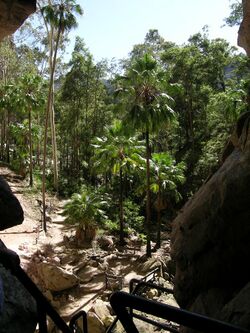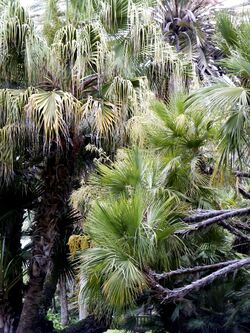Biology:Livistona nitida
| Livistona nitida | |
|---|---|

| |
| Scientific classification | |
| Kingdom: | Plantae |
| Clade: | Tracheophytes |
| Clade: | Angiosperms |
| Clade: | Monocots |
| Clade: | Commelinids |
| Order: | Arecales |
| Family: | Arecaceae |
| Tribe: | Trachycarpeae |
| Genus: | Livistona |
| Species: | L. nitida
|
| Binomial name | |
| Livistona nitida Rodd[1]
| |
| Synonyms | |
|
Livistona sp. Carnarvon | |
Livistona nitida, the Carnarvon Gorge cabbage palm,[1] is a species of flowering plant in the family Arecaceae. It is endemic to Queensland in Australia.[2]
Etymology
Livistona: the generic name was given by Robert Brown[3] to honor Patrick Murray, Baron of Livingston, who was largely responsible for establishing the botanical gardens in Edinburgh, Scotland. nitida: the specific epithet is from the Latin for shining, polished[4] and refers to the shiny, glossy black seeds.[5]
Description
Livistona nitida has cream to yellow flowers, flowers from September to December, and fruits from November to March.[2] It is a functionally dioecious palm, growing to 35 m, with raised leaf scars.[2] The petioles of dead leaves persist for the first metre, but they shed higher up the stem.[2] The inflorescences are unbranched at the base, and extend beyond the limit of the crown, branching up to 4 orders.[2] The flowers are solitary or in clusters of 2-5 and have triangular sepals.[2] The fruit is globose (diameter 13–20 mm) and a glossy black.[2]
Distribution
It is found In the catchments of the Dawson, Comet and Burnett Rivers, and Carnarvon Gorge in Queensland.[2] It is abundant on the margins of streams and in flood plains, but is also found near sandstone cliffs and gorges.[2]
Taxonomy
Livistona nitida was first formally described by Tony Rodd in 1998.[1][6] It had previously been known as Livistona sp. Carnarvon. L. nitida is the accepted name.[1]
References
- ↑ 1.0 1.1 1.2 1.3 "Livistona nitida". Australian Plant Name Index (APNI). https://biodiversity.org.au/nsl/services/name/apni/123571/api/apni-format. Retrieved 20 April 2018.
- ↑ 2.0 2.1 2.2 2.3 2.4 2.5 2.6 2.7 2.8 Govaerts, R.. "Livistona nitida". Board of Trustees of the Royal Botanic Gardens, Kew. https://powo.science.kew.org/taxon/urn:lsid:ipni.org:names:1005518-1. Retrieved 20 April 2018.
- ↑ Robert Brown (1810). "Prodromus floræ Novæ Hollandiæ et Insulæ Van-Diemen : exhibens characteres plantarum quas annis 1802-1805 (p.267)". https://biodiversitylibrary.org/page/36315544.
- ↑ Stearn, W.T. (1992) 'Botanical Latin : history, grammar, syntax, terminology and vocabulary.' (p.452) Timber Press, Portland, Oregon
- ↑ "Palmweb: Palms of the World Online: Livistona nitida". http://www.palmweb.org/cdm_dataportal/taxon/f993eaac-56fb-4b10-a2ab-c6598ae30b29. Retrieved 20 April 2018.
- ↑ Rodd, A.N. (1998), Revision of Livistona (Arecaceae) in Australia. Telopea 8(1): 96, Figs. 2a-b, 3h, 8d, 9b-c
External links
Palmweb 2011. Palmweb: Palms of the World Online: Livistona nitida. Retrieved 20 April 2018. Wikidata ☰ Q5977518 entry
 |


